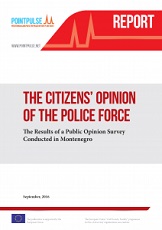2016 THE CITIZENS’ OPINION OF THE POLICE FORCE - The Results of a Public Opinion Survey Conducted in Montenegro
2016 THE CITIZENS’ OPINION OF THE POLICE FORCE - The Results of a Public Opinion Survey Conducted in Montenegro
Author(s): Milena Milošević
Subject(s): Politics / Political Sciences, Politics, Civil Society, Security and defense
Published by: BCBP Beogradski centar za bezbednosnu politiku
Keywords: police force; Montenegro; police sector; public opinion
Summary/Abstract: Six out of ten citizens of Montenegro trust the police. This suggests that police, despite numerous challenges, has citizens on its side as significant impetus to its work. In a nutshell, these opinions include, apart from the high level of public trust, largely positive associations about typical policemen and policewomen. This trust score in police is in contradiction with other survey results, drawing a somewhat complex picture of people’s opinion of the police. Citizens think that corruption in this institution is relatively widespread; that the police predominantly serve particular interests, and that recruitment is not merit-based. Serbs tend to trust the police less and perceive it as particularly alienated. Less than half of the respondents (42%) who declared themselves as ethnic Serbs said that they trust the police highly or completely. This lack of trust is supported by other answers as well: only 21% of the respondents who declared themselves as Serbs stated that the police serve the citizens, while all of 80% said that politicians influence police work completely or to a large extent. By contrast, Albanians, Croats and Bosniaks/Muslims tend to have an above-average positive perception of specific aspects of the police. Although citizens believe that corruption within the police is widespread, they are not eager to report it. The striking majority of over 73% of the respondents said that they would not report corruption within the police even if they were not asked to disclose their personal data. The key trends remain steady in comparison with the survey conducted in 2015. This suggests that relatively turbulent developments and opposition protests in the capital city of Podgorica from October 2015, which resulted in excessive use of force by a number of police officers, have not significantly affected the general perception of the police. Also – like in 2015 – trust in the police and perception of corruption are not positively correlated, indicating the need for further research of key determinants of public trust in institutions. Possible explanations can be associated with the predominant political culture, which is not highly participatory and civic-oriented but is, instead, still parochial and submissive to a significant extent, meaning that a significant portion of population is not eager to question the authorities regardless of their performance. The major novelty of this year’s survey was its focus on women in the police force. Although policewomen were largely assigned positive attributes, some general stereotypes about women appear in this survey as well. Beauty, looks and charm are among the most frequent first associations when it comes to policewomen, while, when asked to describe a typical policeman, only 1% of the respondents listed beauty, looks and charm as their first answer. Also, not a single respondent claimed that a typical male police officer is not suited for the job, while more than 5% of the respondents gave precisely this answer as their first description of women in the police force.
Series: BCBP - Assessment of Police Integrity
- Page Count: 25
- Publication Year: 2016
- Language: English
- Content File-PDF

